No More Room in Hell 2 effectively captures the scrappy alliances and gradually escalating terror of a zombie apocalypse, but a few creative choices threaten to spoil its eerie atmosphere.
There often comes a point in No More Room in Hell 2 when you realise that you’re screwed, and it usually arrives about five minutes before the inevitable occurs. Surrounded by shambling corpses, barricades shrieking under their literal dead weight, you’ll be popping zombie heads with grim precision when cold reality sets in. Maybe it’s the click of your revolver as its ammo runs dry that triggers the revelation, or a fellow survivor you barely know being overwhelmed by the horde. Maybe it’s just the sight of another score of undead stumbling into silhouetted view. Either way, the feeling is the same: you’re going to die, and no amount of struggle will prevent it.
No More Room in Hell 2
- Developer: Torn Banner Studios
- Publisher: Torn Banner Studios
- Platform: Played on PC
- Availability: Out now in early access on PC (Steam and Epic Games Store)
In such moments, No More Room In Hell 2 captures the creeping dread of George Romero’s films better than any zombie game I’ve played in ages. Torn Banner’s pitch-black survival shooter stands at the far end of the zombie spectrum from Left4Dead’s frenetic undead gauntlets, a glacial experience that seems almost trite right until it rolls over you. It’s a promising early access debut, although I fear Torn Banner’s plans for the future already risk spoiling the experience.
No More Room In Hell 2’s primary gimmick has nothing to do with its zombies or how they move. This is an eight-player cooperative shooter set on a single, openly explorable map, with you scouring buildings and cars for weapons and equipment before assaulting a central objective (in the alpha’s case, a power station verging on failure). The twist is all eight players start in different locations, spawning on the fringes of the map with nothing but a length of pipe, a revolver, and a barrel’s worth of ammo to defend themselves. The idea is that, as you skulk furtively toward the map’s centre, you’ll encounter other players in dynamic, haphazard ways, leading to daring rescues, organic teamwork, and perhaps even fleeting friendships.
To see this content please enable targeting cookies. Manage cookie settings
It’s a wonderful notion. In practice, the predefined spawn points and the heavily formatted nature map design rob the concept of some of its power. Between the spawn points at the edge of the map and the main objective at its centre, there are secondary objectives that house equipment stashes, each of which the map funnels two of the eight players toward. Because of this, you quickly learn when and where you’re likely to bump into other players, which makes the experience more predictable than it initially seems.
Nonetheless, it still sorta works. While figuring out how to open the equipment cache inside an abandoned bar, I was accosted by a trio of zombies, and my revolver ran out of ammo on the second headshot. As I was about to get my face munched, the zombie toppled to the left as if sideswiped by a car, its brain ventilated by a rifle bullet from a freshly arrived player.
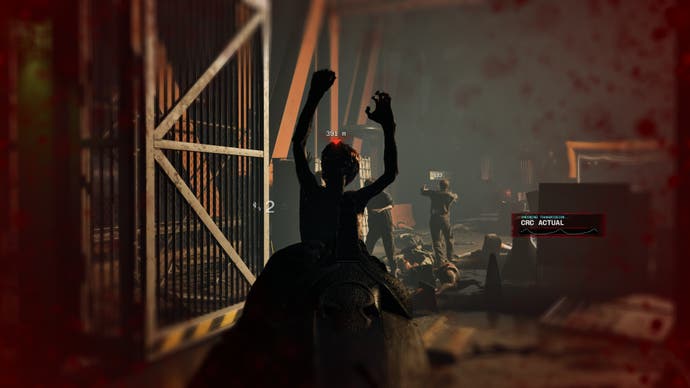
The structure also makes playing with random internet people, if not more appealing, then at least more appropriate. Your awkward conversations and uncertainties regarding mutual capability meld seamlessly with the theme. I played one match with a Chinese player who shot at every zombie he saw, oblivious to the fact that his trigger-happy approach was attracting ever more zombies to our location. While annoying, it was also the exact mistake a newcomer to a zombie apocalypse might make. In another game, I spent a while following around another, more experienced player who kept calling me “mate”. At one point, I fell through the floor of a building into its burning basement. “Oh mate! Don’t worry, I’ll get you out,” he said reassuringly. But it soon became apparent that I would die before he reached me. As my character succumbed slowly to the flames, his forlorn cries of, “Oh mate, mate, maaaaaaate” reverberated in my headset.
It’s an interesting convergence of theme and community. But it’s important to stress that No More Room in Hell 2 doesn’t rely exclusively on this to make the game interesting. The game has a suitably bleak atmosphere of its own. In a literal sense, it’s one of the darkest games I’ve played since Amnesia: The Dark Descent, the only illumination often coming from the headlamps and brake lights of abandoned vehicles, often washing scenes in crimson silhouette. It constantly tempts you into flicking on your torch, even though doing so will inevitably attract more undead. I also enjoy its use of simulated radio transmissions to communicate objectives and subtly update you on player locations.
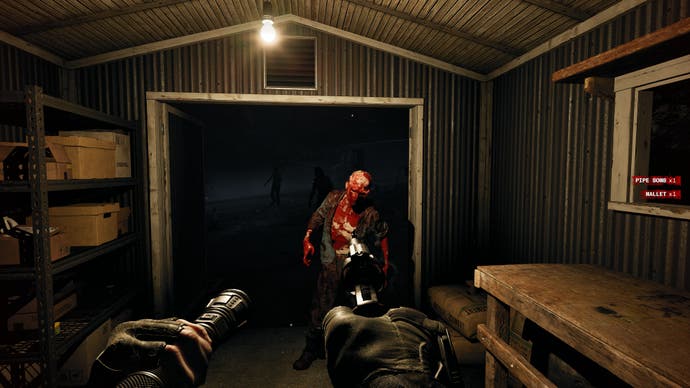
Combat, too, feels distinctive to the experience. Guns are a mainly semi-automatic mix of rifles, shotguns, and handguns, all of which are slow to aim and even slower to reload. Combined with the general scarcity of ammo, every missed shot will have you cursing under your breath, while several consecutive misses are liable to throw you into panic. When shots do connect, the effect is undeniably satisfying. Headshots result in an explosion of cranial matter, while shots to limbs with heavier weapons will often sever them completely, rendering zombies either slower or less dangerous.
Nonetheless, guns are generally best saved as a last resort. If you can, you’re always better off fighting hand-to-hand with knives, tyre irons, and baseball bats. Although they increase the risk of taking damage, they’re also quieter and don’t consume ammo. Melee attacks have a similar sense of weight and impact to the guns- dinging a Zed in the noggin with send them reeling to the side. That said, I think Dead Island 2 has the edge in first-person zombie battery, boasting more refined and more creative bludgeoning tools.
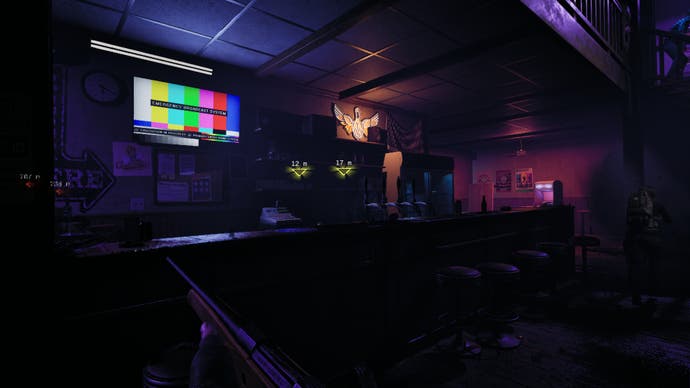
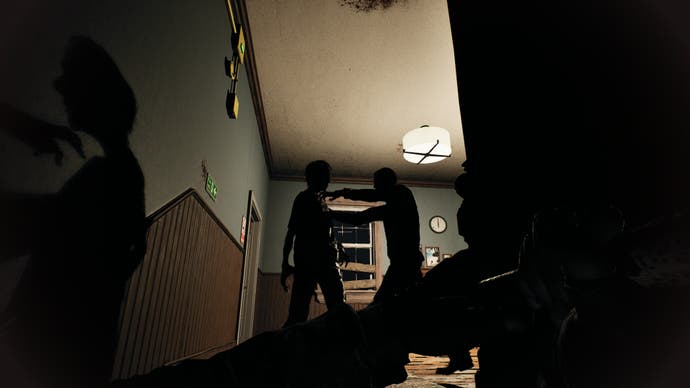
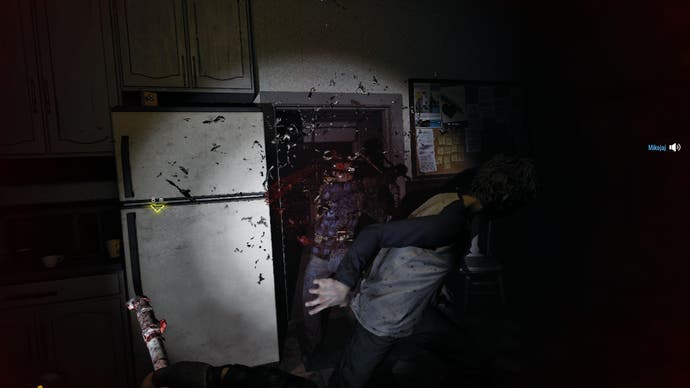
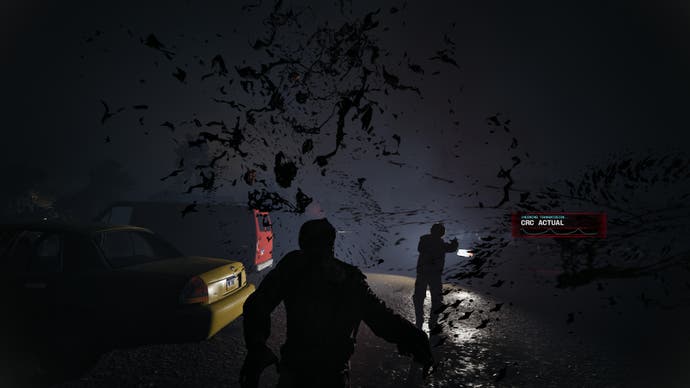
The fundamentals Torn Banner lays down make for an unusual cooperative experience, akin to a less predatory Hunt: Showdown. Indeed, Torn Banner has clearly taken some inspiration from Crytek’s austere extraction shooter, though I’m not sure every idea it borrows is a wise adoption. The most obvious of these is that character death is permanent, with you rolling a new avatar after each demise. While this is consistent with No More Room in Hell 2’s harsh world, success in Torn Banner’s game is vastly more reliant on other players than in Hunt, where your party is limited to pairs or trios. As such, it’s possible to lose a character simply because you played with the wrong crowd. Again, thematically appropriate, but in a way that’s significantly less fun.
My least favourite aspect of No More Room in Hell 2, however, is how it chickens out of its classic zombie setup. The way it depicts the gradual amassing of the undead, how they become an unstoppable force without you clocking the tipping point, is fantastic. But then the crowd of traditional walkers parts to let through a more modern spinting undead, which can easily avoid your sluggish aim to pummel you to the ground. Not only does this completely throw off the game’s deliberate rhythm, but it also spoils the atmosphere. It’s like a toddler who should be asleep in bed ceaselessly crashing a home dinner party. The first time it happens it’s cute, but after the fifth time they burst into the room with no top on to knock over the dips, the novelty has well and truly worn off.
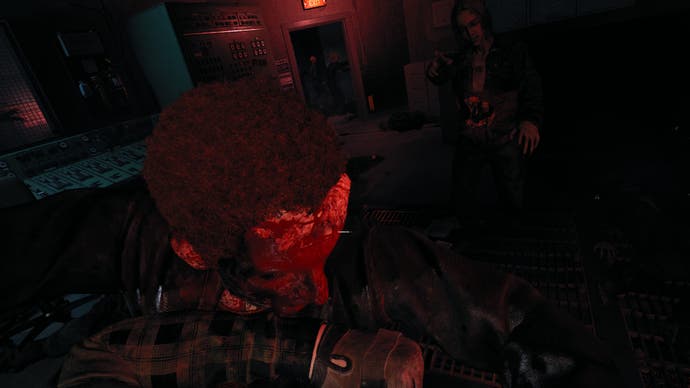
No More Room in Hell 2 accessibility options
On/off toggles for crosshair, crosshair for firearms, crosshair for melee weapons, crosshair for consumable items. Crosshair opacity slider.
Among Torn Banner’s various pledges on its early access roadmap (which includes welcome additions such as a new map and more weapons) it lists ‘more zombie types’. Frankly, I think adding a bunch of quirky specialist zombies is more likely to ruin the game than improve it. The whole point of zombies is that they’re not special. In fact, they seem unremarkable right up to the point you realise three of them have turned into three hundred. No More Room in Hell 2 captures this feeling beautifully, and it should focus on refining it rather than adding a zombie that spits acid or whatever.
I’m slightly baffled by the drubbing No More Room in Hell 2 has received on Steam. Sure, there are rough edges, from amusing bugs such as zombie hair disappearing when you smack them with a pipe, to more serious issues including the occasional crash. But in structure and tone, it’s comfortably the most engaging zombie game I’ve played since the original Dying Light. It takes the concept seriously, patiently builds its tension, and weaves some interesting social dynamics into the mix. I can understand why some people might glance at Torn Banner’s work and write it off as another zombie game. But if anything, No More Room in Hell 2 is a prime example of why you should never take the undead for granted.
A copy of No More Room in Hell 2 was provided for early access review by Torn Banner Studios.
function appendFacebookPixels() { if (window.facebookPixelsDone) return; !function(f,b,e,v,n,t,s) {if(f.fbq)return;n=f.fbq=function(){n.callMethod? n.callMethod.apply(n,arguments):n.queue.push(arguments)}; if(!f._fbq)f._fbq=n;n.push=n;n.loaded=!0;n.version='2.0'; n.queue=[];t=b.createElement(e);t.async=!0; t.src=v;s=b.getElementsByTagName(e)[0]; s.parentNode.insertBefore(t,s)}(window, document,'script', 'https://connect.facebook.net/en_US/fbevents.js');
fbq('init', '560747571485047');
fbq('track', 'PageView'); window.facebookPixelsDone = true;
window.dispatchEvent(new Event('BrockmanFacebookPixelsEnabled')); }
window.addEventListener('BrockmanTargetingCookiesAllowed', appendFacebookPixels);
Source link
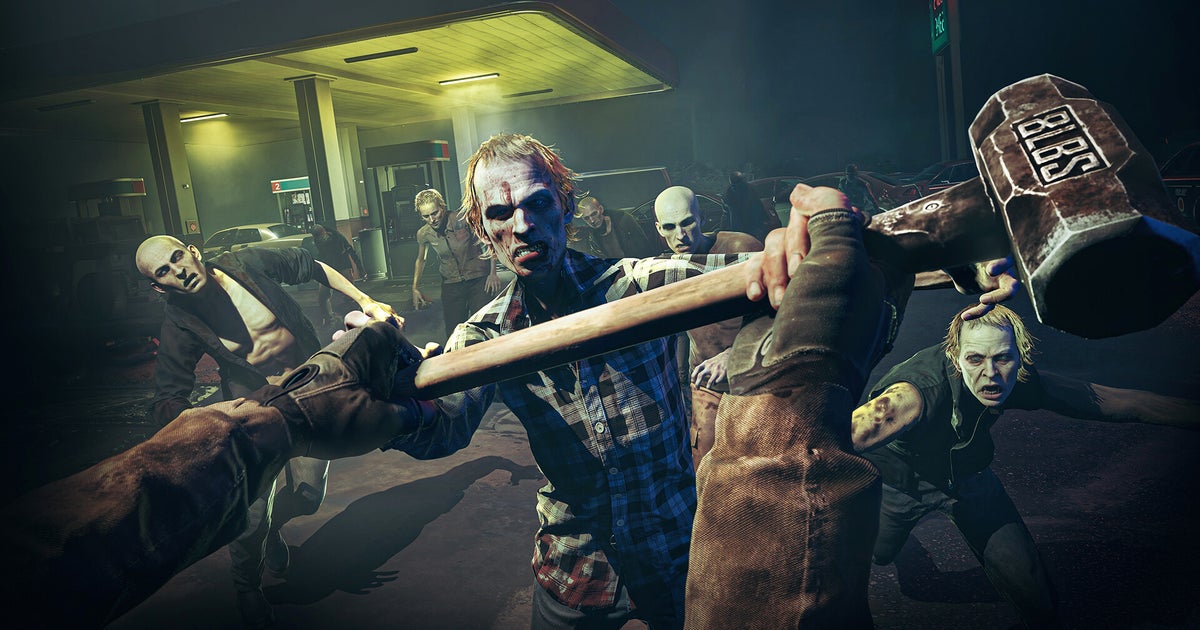

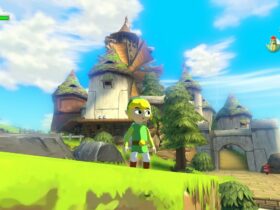
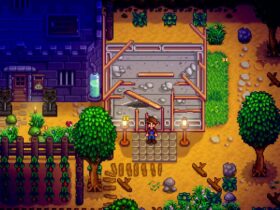


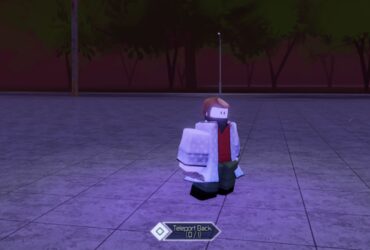


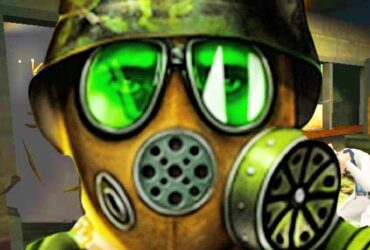
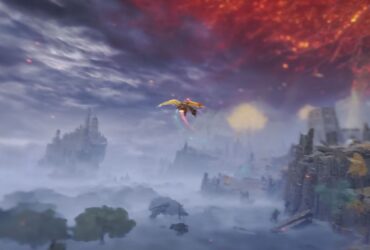
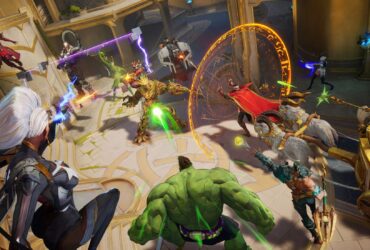
Leave a Reply